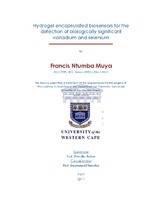| dc.contributor.advisor | Baker, Priscilla | |
| dc.contributor.advisor | Iwuoha, Emmanuel | |
| dc.contributor.author | Muya, Francis Ntumba | |
| dc.date.accessioned | 2018-07-30T13:34:24Z | |
| dc.date.available | 2018-07-30T13:34:24Z | |
| dc.date.issued | 2017 | |
| dc.identifier.uri | http://hdl.handle.net/11394/6129 | |
| dc.description | Philosophiae Doctor - PhD (Chemistry) | |
| dc.description.abstract | Vanadium and selenium salts are toxic in large amounts, but trace amounts are
necessary for cellular function in many organisms. Exposure to high level of selenium
has been linked to delays in early childhood development as well as the
development with onset of diabetes type II. Vanadium is a relatively controversial
dietary supplement, used primarily for increasing insulin sensitivity. These metals
have been identified as potential human carcinogens that disrupt cellular
metabolic processes at high level, causing lung cancer, brain damage and DNA
damage. Developing a sensor system that can monitor the level of vanadium and
selenium in aqueous and selected real samples is a strong priority. | |
| dc.language.iso | en | |
| dc.publisher | University of the Western Cape | |
| dc.title | Hydrogel encapsulated biosensors for the detection of biologically significant vanadium and selenium | |
| dc.rights.holder | University of the Western Cape | |

